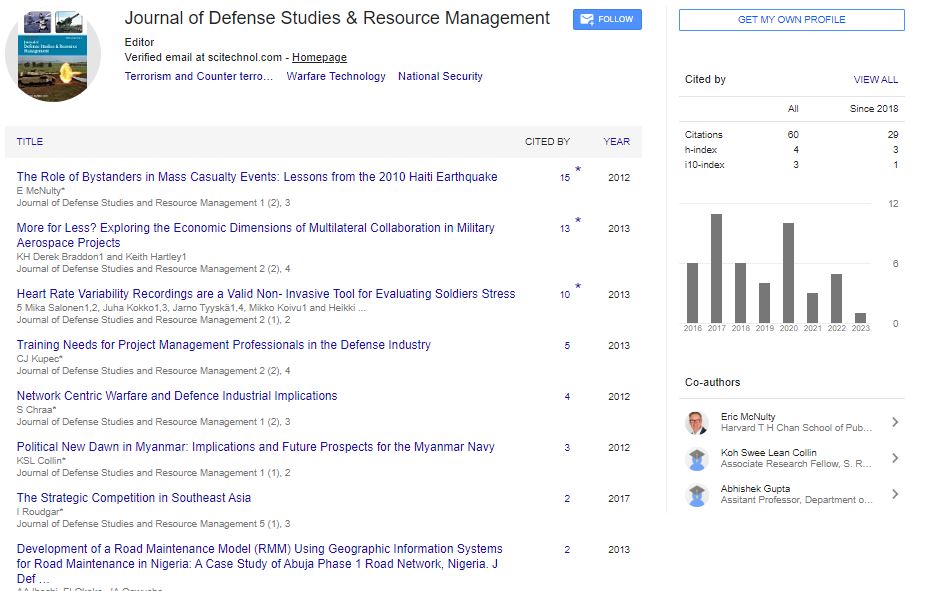Commentary, J Def Stud Resour Manage Vol: 11 Issue: 2
France's Multi-Faceted Approach to Counterterrorism
Sarah Sargent*
1Department of Development Economics, Paris School of Economics, Boulevard Jourdan, Paris, France
*Corresponding Author: Sarah Sargent,
Department of Development Economics,
Paris School of Economics, Boulevard Jourdan, Paris, France
E-mail:sarah69@psemail.eu
Received date: 29 May, 2023, Manuscript No. JDSRM-23-107153;
Editor assigned date: 31 May, 2023, PreQC No. JDSRM-23-107153(PQ);
Reviewed date: 14 June, 2023, QC No. JDSRM-23-107153;
Revised date: 22 June, 2023, Manuscript No. JDSRM-23-107153(R);
Published date: 29 June, 2023, DOI: 10.4172/2324-9315.1000177
Citation: Sargent S (2023) France's Multi-Faceted Approach to Counterterrorism. J Def Stud Resour Manage 11:2.
Abstract
Description
France has been at the forefront of the global fight against terrorism, facing numerous challenges posed by extremist ideologies, homegrown radicalization, and international networks. This article explores France's approach to counterterrorism, examining its historical context, evolving strategies, domestic policies, international cooperation, and the impact of terrorist attacks on the nation. By analyzing France's multifaceted approach, we gain insights into its efforts to confront terrorism and safeguard its citizens while upholding democratic values and human rights.
Historical context
France's fight against terrorism has been shaped by historical events, including the Algerian War, domestic extremist movements, and the emergence of international jihadist networks. Experiences with domestic terrorism, such as the actions of the Corsican National Liberation Front and the Basque separatist group ETA, have influenced France's approach to combating terrorism.
Evolving strategies
France has continuously adapted its strategies to address evolving terrorist threats. Its approach encompasses prevention, intelligence gathering, law enforcement, and military action. The French government has implemented robust counterterrorism legislation, enhanced intelligence capabilities, and established specialized units within its security forces to combat radicalization and disrupt terrorist networks.
Domestic policies
France has implemented various domestic policies to prevent and counter terrorism. These policies include initiatives to address radicalization, strengthen border security, enhance surveillance capabilities, and improve intelligence sharing among different agencies. The nation has also taken steps to counter online extremist propaganda and promote community engagement in preventing radicalization.
International co-operation
France actively engages in international cooperation to combat terrorism. It collaborates with European partners, the United Nations, and regional organizations to share intelligence, coordinate efforts, and enhance counterterrorism capabilities. France has played a significant role in military operations against terrorist groups in the Sahel region of Africa and has contributed to international efforts to combat terrorism globally.
Impact of terrorist attacks
France has tragically experienced several high-profile terrorist attacks in recent years, including those in Paris, Nice, and Toulouse. These attacks have profoundly impacted the nation and have shaped its determination to confront terrorism. They have led to enhanced security measures, increased public awareness, and strengthened resilience in the face of ongoing threats.
Protecting democratic values and human rights
France faces the delicate task of protecting democratic values and human rights while countering terrorism. Balancing security measures with the preservation of civil liberties and societal cohesion is an ongoing challenge. The French government aims to strike a balance that ensures public safety while respecting individual rights, freedom of speech, and religious freedoms. France's approach to counterterrorism is guided by a commitment to protecting democratic values and upholding human rights.
The nation recognizes the importance of striking a delicate balance between ensuring public safety and preserving civil liberties and societal cohesion. In its efforts to combat terrorism, France has implemented measures to prevent radicalization, disrupt extremist networks, and strengthen security. However, it is careful to safeguard individual rights, freedom of speech, and religious freedoms. Additionally, France places great emphasis on promoting social inclusion and fostering dialogue to prevent radicalization. It invests in community outreach programs, educational initiatives, and partnerships with civil society organizations to counter extremist narratives and address the root causes of radicalization.
However, the challenge of protecting democratic values while countering terrorism is complex. Despite the challenges, France remains steadfast in its commitment to protecting democratic values and human rights. It recognizes that upholding these principles is not only essential for the well-being and dignity of its citizens but also crucial for maintaining social cohesion and preventing further radicalization. France's approach to counterterrorism seeks to strike a delicate balance that safeguards both security and the fundamental principles upon which its society is built.
Conclusion
France's resolute approach to counterterrorism reflects its commitment to protecting its citizens and upholding democratic values. Through a comprehensive strategy that includes prevention, intelligence gathering, law enforcement, and international cooperation, France confronts the persistent threat of terrorism. While navigating the complexities of the evolving security landscape, France remains determined to maintain its security, safeguard its democratic institutions, and foster a society resilient to extremism.
 Spanish
Spanish  Chinese
Chinese  Russian
Russian  German
German  French
French  Japanese
Japanese  Portuguese
Portuguese  Hindi
Hindi 